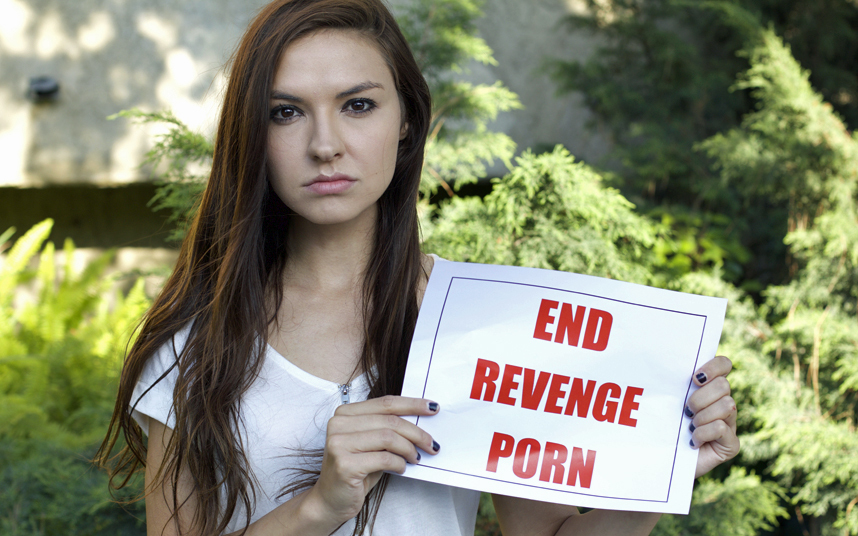
With presidential candidate Hillary Clinton recently pledging at a town hall meeting that she would do whatever she could to end revenge porn (and cyberbullying [call us, Hillary, we can help! Donald, you too!]), I thought it was time to take a closer look at the phenomenon. A couple of weeks ago, I wrote about the latest research on sextortion – which is closely related – and discussed revenge porn two years ago when it started to ping our radars. Revenge porn – sometimes known as nonconsensual porn – has been defined as the act of distributing intimate photography through different means without the individual’s consent. While revenge is not always the motivating factor, this act seems to be increasingly utilized by the perpetrator as retaliation for romantic relationships going south, and is becoming more and more prominent with the growing popularity of sexting. Indeed, there are now an estimated 2,000 revenge porn web sites worldwide, and countless individuals have been repeatedly victimized through the availability of their intimate images in these venues.
Research on Revenge Porn
In terms of more specific numbers, the nonprofit Cyber Civil Rights Initiative conducts annual surveys to get a sense of the prevalence of – and experiences with – revenge porn victimization. However, it must be stated that their surveys are based on a convenience sample; they simply solicit respondents through a link on their own web page. This means that their numbers will be inflated because they are only collecting information from individuals who have chosen to visit a revenge porn help web site. As a consequence, it also means that we can’t make any sweeping generalizations and apply the findings to the population at large.
All of this said, of the 1,606 respondents from the ages of 18 to 30 in their most recent survey from 2015, 61% (about 980 people) said they had taken nude photos or videos of themselves and shared them with someone else, and 23% of respondents (361 people) had been victims of revenge porn. Among revenge porn victims, 93% reported significant emotional distress, while 82% reported suffering significant impairment in social, occupational, or other important areas of functioning. Over half (51%) of victims indicated that they had even considered committing suicide. With regard to their occupation, 55% of respondents feared that their professional reputation would be tarnished because of revenge porn, while 39% said that the crime actually affected their professional life.
Revenge Porn Laws
To date, 38 states have laws against nonconsensual porn, but a careful review illuminates a meaningful lack in uniformity and unambiguity (see our State Sexting Laws page for more information). Most outlaw the “dissemination of intimate images” because of the lack of consent from the affected party, while some states recognize the behavior as an act of cyberharassment and stalking, and prohibit it in that respect. Generally speaking, each state’s statute is different in classifying exactly what is unlawful. Using Florida law as an example (passed in November 2015, which makes the act a 1st degree misdemeanor and 3rd degree felony for repeat offenders), the state defines sexual cyberharassment as publishing a sexually explicit image of a person that conveys the personal identification information of the depicted person without the person’s consent and for the purpose of causing substantial emotional distress. New Jersey, the first state to pass a law against nonconsensual porn, considers it a 3rd degree invasion of privacy if someone discloses any image in which intimate parts of another are exposed, and defines “disclosure” as selling, manufacturing, giving, providing, mailing, delivering, or advertising an image. The state of Virginia categorizes their law under crimes involving morals and decency, and considers it the unlawful dissemination or sale of images of another. Specifically, they have ruled that anyone who disseminates or depicts another person who is totally nude, or is exposing genitals, pubic area, buttocks, or female breast when they are not authorized to do so is guilty of a Class 1 misdemeanor.
As evidenced above, state punishments for revenge porn vary by the weight put on the behavior, and a few more examples help to further illuminate the diversity of sanctions. For instance, California’s punishment is a $250 fee with no more than 48 hours of community service following the first and second offense, as they consider it a disorderly conduct misdemeanor. Subsequent offenses in California result in a $400 fee and imprisonment for 90 days in a county jail. Texas issues a temporary restraining order between the victim and perpetrator, and fines the criminal $500 if the action was not intentional, but $1,000 if the action was intentional. In Washington D.C., punishment for distribution of nonconsensual or revenge porn results in a misdemeanor, a fee, and the possibility of up to 180 days in prison. Nevada assigns the perpetrator with a category D felony, while Pennsylvania marks minors with a first degree misdemeanor and adults with a second degree misdemeanor.
No federal law has been established regarding nonconsensual porn, but the Cyber Civil Rights Initiative continues to work closely with state legislatures to pass laws against nonconsensual porn, and have been personally responsible for drafting over a dozen laws in various states. Currently, Kentucky, Massachusetts, Missouri, New York, Rhode Island, and South Carolina have bills pending in legislation. New Hampshire’s law classifies the behavior as a Class B felony and goes into effect on July 18th of this year. s also a new addition to states that have laws against nonconsensual porn. Minnesota’s law goes into effect a couple weeks later on August 1st, and considers it a Gross Misdemeanor. It is clear that revenge porn remains a top agenda item for legislators across the United States; the CCRI worked with California congresswoman Jackie Speier to proposal a federal law in this area in 2015 entitled the Intimate Privacy Protection Act. In my professional opinion, I believe it will come to pass after Congress and the powers that be sort out the First Amendment implications (for a great discussion on this, please see Pace Law Professor John Humbach’s paper on this from September 2014 entitled The Constitution and Revenge Porn). Major Internet companies like Facebook, Twitter, and Google have (rightfully) taken a strong stance against the problem and have, for example, worked with California’s Attorney General to outline best practices to help remove revenge porn found on their networks.
Revenge Porn Victims Need Help
As I mentioned in my write up on sextortion research a couple of weeks ago, we are definitely seeing an uptick in contacts to our site about the unauthorized dissemination of intimate images from victims. Hearing their stories is honestly heartbreaking. It might be easy for some to blame the targets for sending the image in the first place, but many images are obtained via hacking, secret recording, or other illicit means. Furthermore, even if the images were voluntarily sent, they were done so with an implied agreement of trust. All human relationships are built on trust, and everyone would do well to humbly and graciously remember the times when the trust they gave in good faith to someone else was callously broken and stomped on. That is exactly what has happened in these situations, and those victimized not only need our empathy, but our specific and tangible help. Below are some suggestions and avenues for recourse, and we’ll keep adding to this as more formal assistance becomes available.
With the help of the Digital Millennium Copyright Act (DMCA), victims of revenge porn are able to file a report for copyright infringement when they find that images of them have been reposted without permission. For example, Twitter and Tumblr provide an easy-to-use form towards this end, and we wish that other social media companies would do the same (Facebook’s is a little convoluted and complicated, in our opinion). UnDox.Me also provides a helpful guide for major social media sites to assist with the removal of copyrighted images and the upholding of copyright law. Victims can also utilize Domain Tools to find contact information about specific site hosts and domains and contact them directly about taking images down via their “abuse@” email address.
Another helpful resource is Without My Consent, a non-profit organization that focuses on providing advice and strategies to help combat online harassment. For example, they suggest that victims immediately work to create a physical portfolio (screenshots, printouts, downloads of videos, relevant texts or emails) of the dissemination and the events leading up to it for the purposes of evidence preservation and documentation. In addition, Without My Consent provides a Something Can Be Done! Guide, a detailed page entitled Conversations to Have With Your Lawyer, directions to obtain a Take Down, and steps to register a copyright on your images.
Registering your own copyright can provide substantial backing if a victim is considering filing a lawsuit for infringement, and can also give people the opportunity to censor out parts of their images under their copyright or their images in entirety. By copyrighting original works, people who involve themselves in taking nude photographs or videos can protect their property from being wrongly distributed or reposted by giving themselves the right to file for copyright infringement. This, then, expedites websites’ removal of problematic content, provides greater leverage against perpetrators, and provides an opportunity to collect damages ranging from $750 to $150,000 for each work that is infringed. However – and this is key- registration is not required for victims who wish to bring a lawsuit and decide to forego any claims of copyright. According to Without My Consent, victims can choose to rely on existing state law claims like invasion of privacy, confidentiality, emotional distress, harassment, and stalking. Whether to file for copyright or build a case around existing state laws should be decided in consultation with an attorney. This said, hiring a lawyer can cost thousands of dollars and is not a solution that many victims are able to pursue.
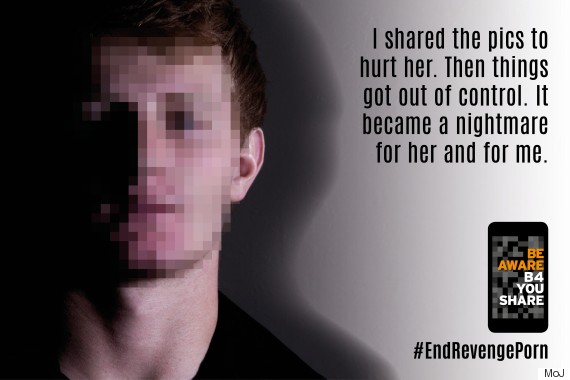
As revenge porn becomes more prevalent, a growing number of initiatives are thankfully being developed to give victims the emotional, social, legal, and practical help they need. Apart from the previously mentioned Cyber Civil Rights Initiative, Without My Consent, and UnDox.Me, we also recommend and appreciate the efforts of Crash Override Network, and HeartMob. These organizations provide guidance and general protocols for victims to follow, and some offer opportunities to either anonymously or publicly share personal stories to receive comfort, wisdom, and support from others. The Cyber Civil Rights Initiative provides a 24/7 crisis hotline reachable at 844-878-CCRI (2274), though it is only available to people living within the United States at the moment. Crash Override Network also provides a crisis helpline for those suffering from online abuse, although it is through email. Persons assisting with the helpline come from a range of backgrounds and include survivors, IT professionals, attorneys, and lawmakers – and so a wealth of expertise is available to come to the aid of individuals in the throes of victimization. Additionally, the Crash Override Network provides helpful advice on how to cope with the trauma of online abuse, how to disclose the information to family and employers, and how to protect oneself from future harm.
Finally, HeartMob is a growing community of concerned individuals who simply want to help anyone who is being harassed online – whether as a result of nonconsensual pornography, or otherwise. They state that “freedom of speech online doesn’t mean anything if people are not free from abuse and harassment,” and are constantly adding to the resources they make available to those who are being victimized in any capacity online. They also invite you to sign up and become a Heartmobber – someone who is willing and available to help those who contact the site for assistance.
It is not clear whether this phenomenon will grow in frequency and severity with the current and next generation of youth and young adults to whom social media use and picture/video sharing has largely been ubiquitous. Perhaps you know someone who has been victimized by revenge porn. Perhaps you are that person. Overall, we want those targeted to know that help is available, and that something can be done to cope with and overcome the trauma they may face. We also want those who might consider sharing or posting an unauthorized image or video of someone without their permission to fully comprehend the gravity of what they are about to do, and understand the weight of sanctions that they may face. More and more legislators and criminal justice personnel are viewing it in a similar light, and will continue to take a serious stance in their policies and punishment to respond to current victimization, and prevent future ones.
Image Sources
http://i.telegraph.co.uk/multimedia/archive/03343/ChrissyChambers_En_3343155k.jpg
http://www.endrevengeporn.org/main_2013/wp-content/uploads/2014/05/ERP4.png
http://static1.squarespace.com/static/54fa4c94e4b07e462fd56d5d/t/55e321fce4b0906ea9bb70b9/1440948733942/
http://i.huffpost.com/gen/2602952/thumbs/o-REVENGE-PORN-570.jpg
http://i.telegraph.co.uk/multimedia/archive/03197/card-1_3197800b.jpg

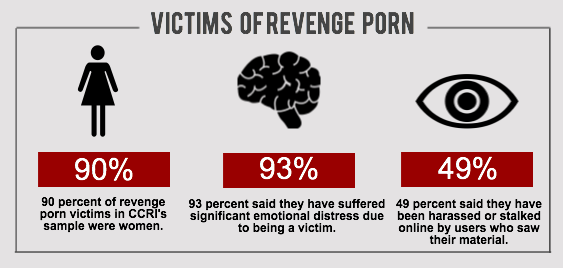
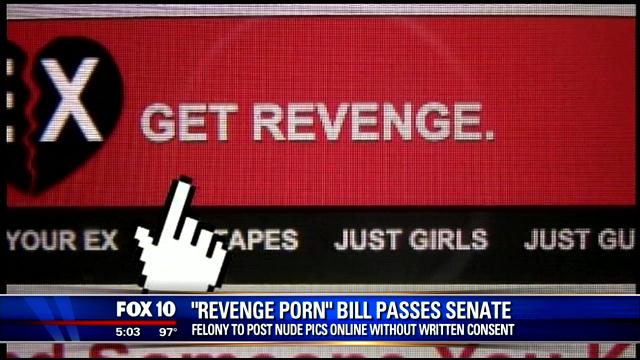
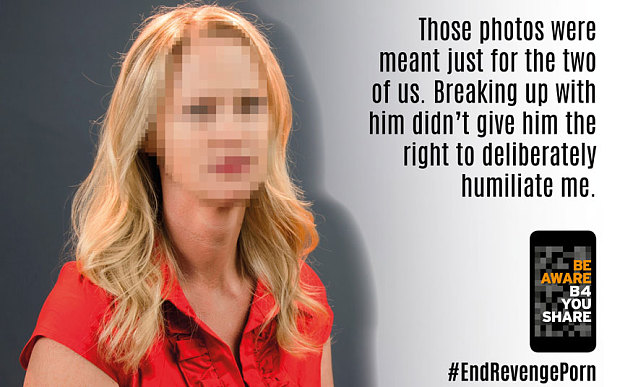







Please I want to report about porn revenge please help. I am between life and death please help me
Please let us know how we can help you. Also try contacting http://www.crashoverridenetwork.com and https://www.cybercivilrights.org. There is help for you. You are not alone.
If there is help , then why won’t anybody listen or really help. I am in danger due to being blackmailed into doing pictures and now they are being spread all over with a smear campaign. Because I got away from this lady. She told me , if I can’t have you , nobody will want you. She also said by the time she is done , I will commit suicide. That has not worked. So she told the neighborhood drug dealer that I was trying to bust him. I filed a four page police report . And they humiliated me so bad , I wanted to crawl in a hole . Talked down to me. If you are going to bust a drug dealer , you don’t make it public knowledge. Not one person in this town is smart enough to think about that. You don’t even tell your mother. Gee do you think that is why crimestoppers keeps you invisible ? She is a severe narcissist and very dangerous. Funny thing , I’m disabled. So there is no help or hope. Attorneys they boast about how they will help, but won’t even call you back. Especially if you are disabled and need a payment plan.
Alan, I emailed you privately to try to help you. Do check your email. Sorry you are dealing with all of this.